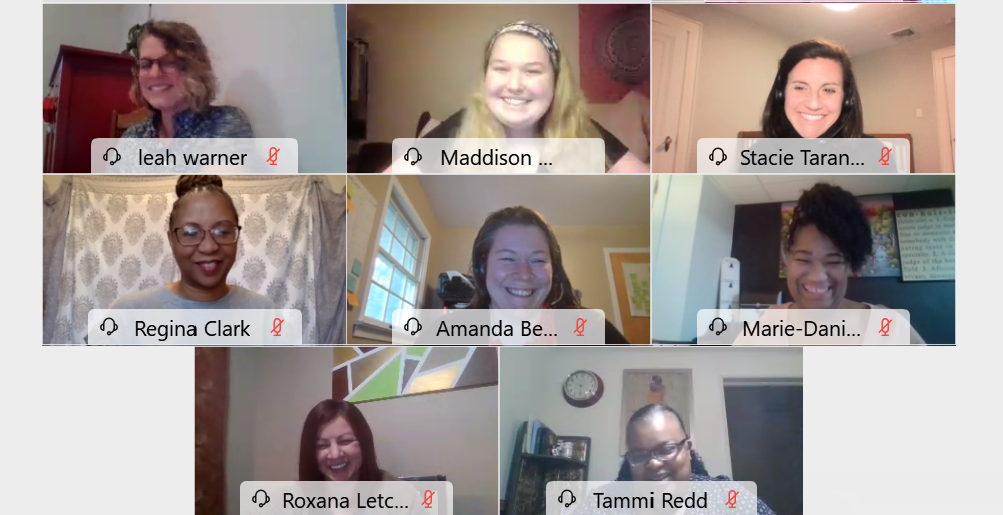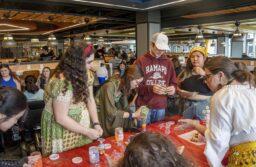
Photo by Danielle DeAngelis
In celebration of Women's Herstory Month, the Office of Violence Prevention (OVP) and the Women's Center and LGBTQ+ Services hosted “Women in Academia: Their Triumphs and Struggles” on Wednesday, March 24 at 5:30 p.m. This event was held virtually over Webex.
OVP coordinator Marie-Danielle Attis opened the event with remarks about the selected professors for the panel. Five female professors, one representing each Ramapo school, were selected to speak about their experiences and answer questions.
“I think we did a great job bringing the essence of Ramapo onto this panel,” Attis said.
Interns from the OVP office, Roxana Letchi and Maddison McKinney, moderated the panel. Letchi directed for each panelist to introduce themselves to the attendees.
The first panelist introduced was SSHS professor Dr. Leah Warner. Warner has been teaching psychology courses at Ramapo since 2008 and is a co-convener of the women’s, gender and sexuality studies minor. She always wanted to be a full-time student, which led her to a career in academia.
Dr. Tammi Redd represented ASB as a management professor for the school since 2012. She took college courses she was interested in well into her adulthood, and an Asian history professor encouraged her to pursue a career in teaching due to her love in learning.
Dr. Amanda Beecher joined Ramapo as an associate professor of mathematics for TAS in 2010 and is the current convener of the data science program. “A lot of great mentors steered me into the path of academia,” Beecher said.
Professor Regina Clark has been an instructor for the communication arts program in Ramapo’s CA school, particularly journalism and writing, since 2004. Being a professor wasn’t her original plan, but going to graduate school inspired her, as she loved learning from “great” professors.
And the final panelist was Dr. Stacie Taranto, who has been a history professor for Ramapo’s HGS school since 2010. Taranto has always loved learning about history and politics, and she gravitated towards a teaching profession because she wanted to share her knowledge.
McKinney asked the first question: What does each panelist love most about their job and what do they like the least?
“I enjoy the kinds of work I do and working on problems in the classroom,” Beecher said. “Being able to work closely with students and giving them research opportunities. I find building strong connections to be so valuable and it really makes me enjoy my job.”
“I enjoy that I get to teach in a smaller classroom setting,” Clark said. “I also like that I get to advise students within the communication arts major as it helps me learn more about them on a different level, and not just from an academic standpoint.”
Redd and Beecher admit that their least favorite part about their job is saying goodbye to senior students, whereas Clark, Taranto and Warner all agree that grading is the most challenging portion, especially in the virtual classroom setting.
This transitioned into the next question as each professor answered what challenges they face as a woman in academia. Taranto noted that she did not face any challenges as a student regarding her gender, but this changed when she became a professor.
“In graduate school, I didn’t face many barriers because I studied a women dominated field,” she said. “When I entered this profession, I noticed some differences. The women would get closet offices with no windows whereas the men would get larger office spaces with a view.”
The gender roles continued and at times are still prevalent, according to Taranto.
“I feel like to get respect, I need to dress differently. And I will still be called ‘Mrs.’ which bothers me, because it’s ‘professor’ or ‘doctor.’ My male colleagues don’t have to work as hard for that respect,” Taranto said.
When regarding women role models that inspired each panelist, many talked about the women in their families: mothers, aunts and older sisters were all prime examples.
However, Warner instead mentioned a professor she had in graduate school, a professor that has been keeping up with her success and has motivated her since 2006.
“That has been so foundational in helping me in my career,” Warner said.
An audience member asked how each panelist was able to decide on an institution for continuing their post-undergraduate studies. Redd answered with confidence, as she struggled with the selection process herself.
“I think there is a tremendous amount of flexibility required in identifying the right place for yourself,” Redd said. “It’s really difficult to handpick what region you want to be in, but with flexibility, it won’t take long for you.”
The last question of the night was simple yet powerful and important: What would each woman tell their younger selves?
“Surround yourself with good people who do really good things, and you’ll be guaranteed to have a good life,” Redd said.
“Be kind to yourself, even if it doesn’t work out,” Taranto said. “Every experience gives a chance for learning. You’ll get something out of everything.”
Closing remarks were given by CSI director Rick Brown, who proceeded to compliment each panelist on their individual successes on campus.
ddeange1@ramapo.edu





